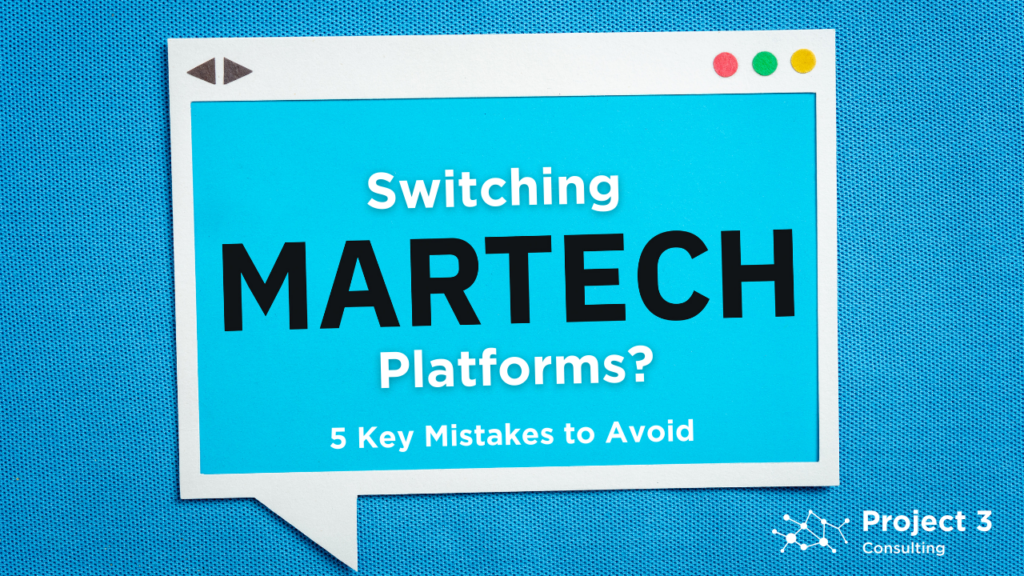
Are you pondering a switch to a different MarTech platform? Then you may want to hear this worrying stat before you start: More than 80% of migrations either fail to deliver on time or go over budget.
Whether you’re transitioning from Google Tag Manager to Tealium iQ, Drupal to WordPress, GA4 to Adobe Analytics, or Mailchimp to Brevo, successful MarTech platform migrations require extended planning and execution. Otherwise, you may be left with a heap of mangled data that you won’t be able to use for your marketing endeavors, and your shiny new platform might as well be a glorified full name-only rolodex. So let’s go over the common mistakes businesses make during their MarTech migration and make sure your transition to a different platform is a success.
1. Lack of a Clear Roadmap
Why It’s Important:
- Clarity and Direction: A roadmap provides a clear direction for the entire project, ensuring all team members understand their roles and responsibilities.
- Identifying Dependencies: It helps identify and manage dependencies, preventing bottlenecks that can delay the project.
One of the most common pitfalls in MarTech migrations is the absence of a well-defined roadmap. Without a clear plan in place, you risk encountering unforeseen obstacles that can derail the entire process.

By establishing a detailed roadmap that outlines specific milestones, timelines, and dependencies, you can mitigate risks and ensure smoother transitions. A clear roadmap should include a thorough analysis of your current systems, a defined project scope, key objectives, and a detailed timeline. Regular reviews and updates to the plan are crucial to adapt to any changes or new insights during the migration process.
2. Underestimating Data Migration
Why It’s Important:
- Data Integrity: Ensuring the accuracy and completeness of data is critical for maintaining operational continuity and making informed decisions.
- Operational Continuity: Poor data migration can disrupt business operations, leading to inefficiencies and errors.
Data serves as the lifeblood of your marketing efforts, making the accurate migration of data important in any transition. Failure to adequately plan for data migration can result in data loss, corruption, or inconsistencies that undermine your marketing strategies.
Picture this: you’re a healthcare provider that didn’t thoroughly map and clean your data before migrating to a new patient management system. The result? Mismatched patient information and operational inefficiencies—yikes!

To avoid such setbacks, you must conduct comprehensive data audits, meticulously map data migration processes, and implement rigorous testing protocols to validate data integrity throughout the migration process. Effective data migration strategies should involve data cleaning to remove duplicates and errors, data mapping to align old and new system structures, and continuous validation to ensure the migrated data meets quality standards.

3. Not Communicating With All Team Members
Why It’s Important:
- Aligned Objectives: Engaging all team members ensures that the migration aligns with the overall business objectives and meets everyone’s needs.
- Preventing Miscommunication: Clear communication prevents misunderstandings that can lead to project delays and errors.
Successful migrations hinge on the active engagement and collaboration of all team members across departments. Clear communication and alignment of objectives are essential to preventing missteps that can compromise project timelines and outcomes. Could you imagine if you didn’t communicate with your marketing team when you switched to a different CDP? This lack of coordination could result in conflicting priorities and delayed implementation schedules.

To foster collaboration, businesses should involve key stakeholders from the outset, solicit feedback at each stage of the migration, and establish regular checkpoints to address concerns and ensure alignment with overarching business objectives.
4. Insufficient Staff Training
Why It’s Important:
- Smooth Transition: Proper training ensures a smooth transition and minimizes disruptions.
- Maximizing ROI: Well-trained staff can fully utilize the new platform’s features, maximizing the return on investment.
While businesses often allocate resources to the development and transition phases of a migration, they frequently overlook the importance of comprehensive staff training. Inadequate training can lead to operational disruptions and underutilization of new platform features. Take, for example, a top player in the automotive industry that migrated to a sophisticated consent management platform but failed to provide adequate training to its team. You already know this is a recipe for disaster–one that Project 3 would eventually help fix. The lack of familiarity with the platform’s capabilities hindered the campaign’s effectiveness, which could have led to potential legal violations posing significant business and financial risks, including hefty fines, reputational damage, and loss of customer trust.

To empower staff and maximize the benefits of new technologies, businesses should implement robust training programs that encompass hands-on workshops, online tutorials, and ongoing support. By investing in staff education, organizations can enhance productivity, minimize learning curves, and optimize the use of MarTech tools.
5. Skipping Comprehensive Testing
Why It’s Important:
- Risk Mitigation: Comprehensive testing identifies and mitigates potential risks, ensuring a smoother transition.
- System Reliability: Thorough testing ensures the reliability and stability of the new system.
You know the old saying, “Practice makes perfect!” Be sure to test, test, and test again. Rushing through testing phases is a common pitfall that jeopardizes the success of MarTech platform migrations. So be sure to utilize comprehensive testinl for identifying and rectifying potential issues before they impact business operations.

To mitigate risks, businesses should develop detailed testing plans that encompass functionality testing, performance testing, and user acceptance testing. By simulating real-world scenarios and soliciting feedback from end-users, organizations can ensure the reliability, functionality, and seamless integration of new MarTech platforms.
Need Expert Assistance?
Avoiding these common mistakes is crucial for a smoother MarTech platform migration. At Project 3 Consulting, we specialize in navigating the complexities of MarTech migrations. Our experts are ready to implement even the toughest projects, ensuring your migration is on time, on budget, and aligned with your business goals.
Reach out to us today for a consultation and take the first step towards a successful MarTech platform migration.




